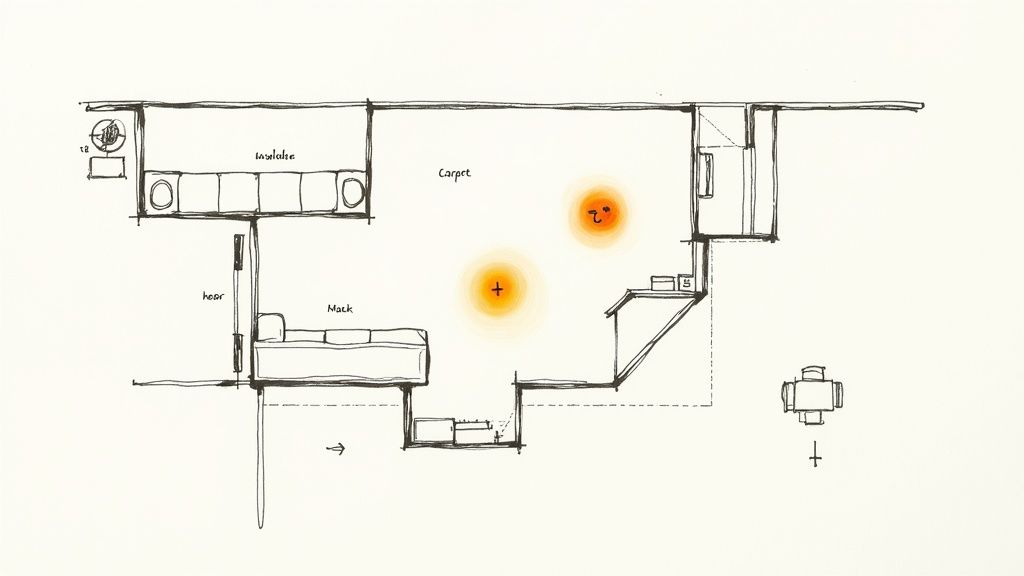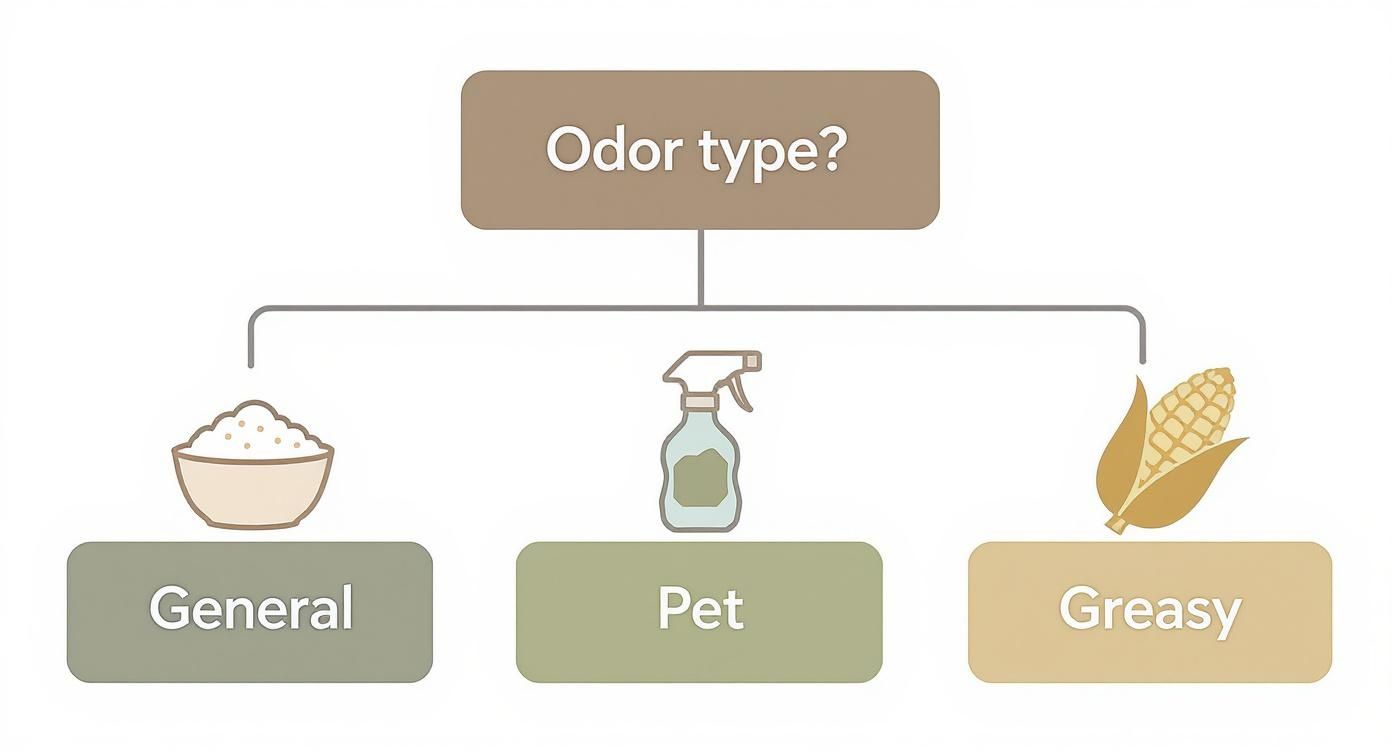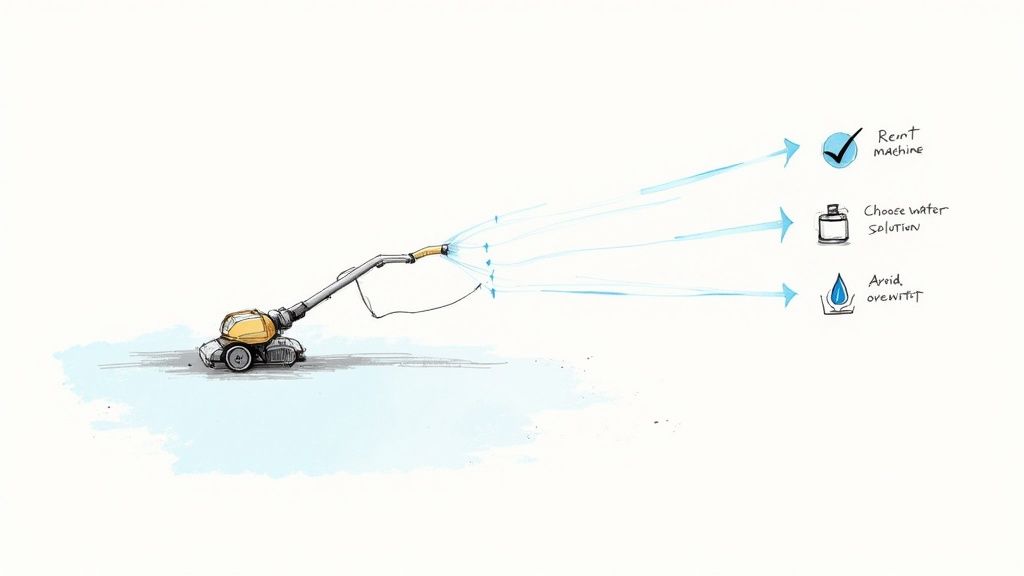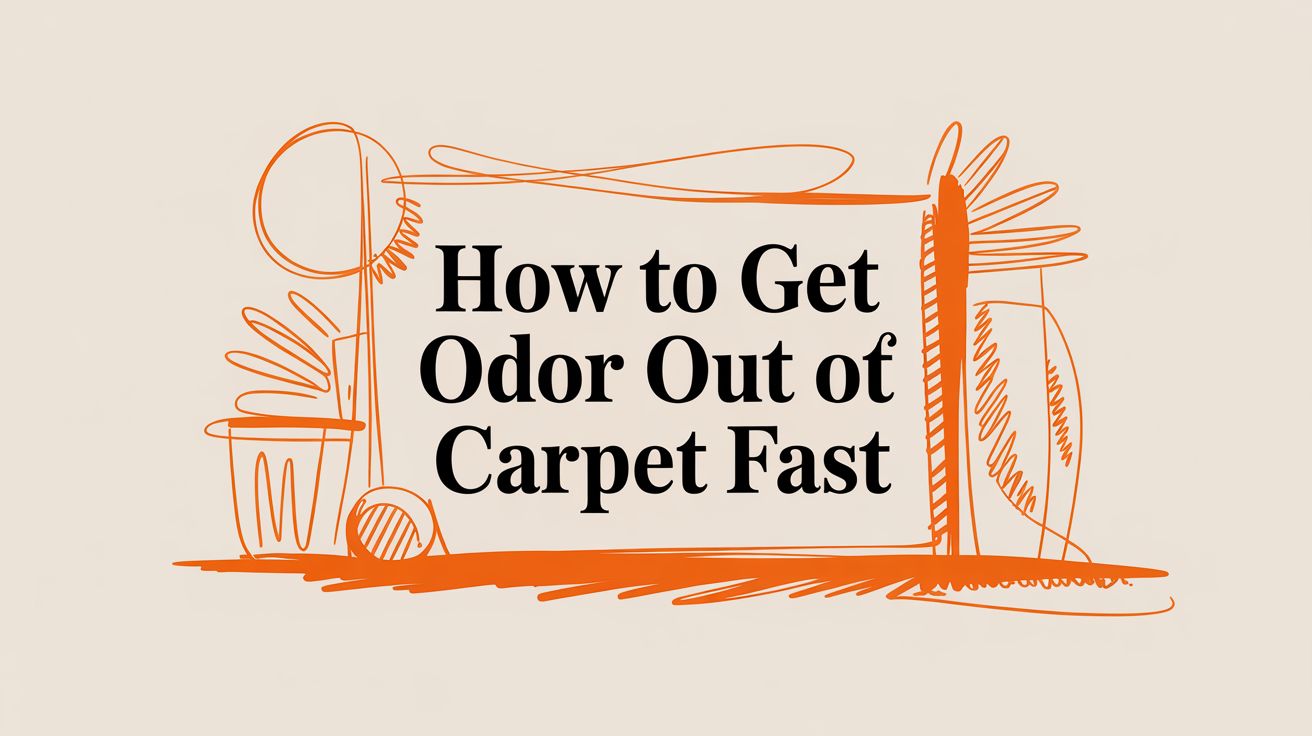Before you can get a nasty odor out of your carpet for good, you have to play detective. The absolute most critical step is pinpointing exactly where the smell is coming from and what's causing it. Is it a hidden pet accident? A bit of mildew from a forgotten spill? Whatever it is, finding the source determines which solution will actually work.
Why Your Carpet Smells and Where to Look

Hold off on grabbing that can of carpet freshener for just a minute. You need to understand what you're really up against. Carpet odors are rarely just a surface-level problem; they're usually a sign of something deeper going on in the fibers, the padding, or sometimes even the subfloor itself.
Figuring out the culprit first saves you from wasting time and money on treatments that just cover up the smell for a day or two before it comes roaring back.
Common Odor Sources to Investigate
More often than not, the really stubborn smells in carpets come from something organic. These things create persistent odors because they become a food source for bacteria, and it's the gassy waste from these multiplying bacteria that you're actually smelling. Yuck.
Here are the usual suspects you should check for first:
- Pet Accidents: Urine is public enemy number one. Even long after a spot feels dry, uric acid crystals get left behind. The moment a little humidity hits the air, those crystals reactivate, and the smell is back.
- Mildew and Mold: That musty, earthy smell is a dead giveaway for mildew. It doesn't take much—a spilled drink that wasn't cleaned up properly or a slow leak can create the perfect damp spot for it to grow. For a deeper dive, check out our guide on using a https://citruscarpetcleaningatlanta.com/mildew-remover-for-carpet/.
- Spilled Food and Drinks: Things like milk, grease, or sugary sodas can seep into the fibers and basically ferment over time, leading to some seriously sour and rancid smells.
- Smoke Particles: If you're dealing with cigarette smoke, you know how it clings to everything. Those oily smoke particles grab onto carpet fibers and are notoriously difficult to get rid of, releasing a stale smell for ages.
The first rule of odor removal is to find the "why" behind the smell. Just sprinkling baking soda on the surface isn't going to fix a mildew problem that's taken root deep down in your carpet padding.
Locating the Exact Problem Area
Sometimes the source of the smell isn't obvious at all. A pet might have had an accident in a corner you never look at, or a spill might have happened under a piece of furniture. A black light is an amazing tool for this kind of detective work. It makes old urine stains glow, instantly revealing invisible problem spots you'd never find otherwise.
Understanding why pet odors keep coming back, especially from issues like incontinence, is key. For households with older pets, looking into different pet incontinence solutions can be a game-changer for preventing future accidents and the smells that come with them.
It’s no surprise that the market for pet odor eliminators is huge and still growing—it was valued at USD 14.16 billion. It just goes to show how many of us are looking for reliable ways to keep our homes smelling fresh.
Your Go-To DIY Carpet Deodorizing Toolkit
Before you run out and buy some expensive, chemical-heavy spray, take a peek in your pantry. You might be surprised to learn that some of the best tools for getting odors out of your carpet are probably already on your shelves. These simple, budget-friendly items don't just cover up smells—they actually neutralize them.
The trick is knowing which solution to use for the specific smell you're dealing with. A greasy food odor needs a totally different game plan than a musty, damp scent. With just a little know-how, you can build a seriously powerful deodorizing arsenal with stuff you already have.
Baking Soda: The Ultimate Odor Absorber
There's a reason baking soda is the undisputed champ of DIY odor removal. It’s basically sodium bicarbonate, a natural compound that zaps both acidic and alkaline odors by absorbing them right out of the air and carpet fibers. It's safe, super cheap, and you can use it for almost anything.
For a general musty smell or other light, lingering odors, a generous sprinkle across the whole carpet is your best first move. You'll want to let it sit for at least 30 minutes before vacuuming. But for the really tough smells, patience is key.
When you're up against deep-set odors like old smoke or persistent pet smells, leave the baking soda on your carpet overnight. Giving it a good 8 hours (or even longer) allows it to work its magic and pull out those odor-causing molecules trapped way down in the fibers.
Don't be shy with it, either. You want a fine, even layer covering the problem areas. Once it's had time to sit, vacuum it up—go slow and be thorough to make sure you get all the powder and the trapped smells out.
White Vinegar: The Acidic Odor Neutralizer
While baking soda is great for a wide range of smells, white vinegar is your secret weapon against strong alkaline odors, especially ammonia from pet urine. The acidity in the vinegar breaks down the nasty bacteria causing the smell, wiping it out for good.
Making a vinegar spray is a piece of cake:
- Grab a clean spray bottle and mix one part white vinegar with one part cool water.
- Lightly mist the smelly patch of carpet. And I mean mist it—do not soak it.
- Just let it air dry completely. The vinegar smell will be pretty strong at first, but it vanishes as it dries, taking that bad odor right along with it.
Before you go spraying your whole living room, it's absolutely essential to do a spot test. Find a hidden area, like inside a closet or under the sofa, spray a little bit of the mix, and let it dry. Check to make sure there’s no color bleeding or damage to the fibers before you go any further.
Cornstarch and Essential Oils for Targeted Issues
Beyond those two powerhouses, a few other pantry staples can help you get stubborn odors out of your carpet. Cornstarch, for example, is fantastic for absorbing greasy or oily spills that can start to smell rancid over time. Just like baking soda, you sprinkle it on, let it sit and soak up the oil, and then vacuum it all up.
And if you want to add a final touch of freshness without using artificial fragrances, essential oils are your friend.
- Mix 10-15 drops of your favorite essential oil (lavender, lemon, and peppermint work great) into a cup of baking soda.
- Put it in a jar with a lid and shake it up really well to get the oil distributed.
- Sprinkle this scented powder on your carpet, give it about 30 minutes, and vacuum for a clean, natural aroma.
This approach not only deodorizes but leaves the room with a pleasant, subtle scent.
DIY Odor Remover Effectiveness Guide
Not sure which pantry item to grab for your specific odor problem? Here’s a quick-glance table to help you match the right ingredient to the smell you're fighting.
| DIY Ingredient | Best For Odor Type | Application Method | Key Tip |
|---|---|---|---|
| Baking Soda | General mustiness, smoke, food | Sprinkle, wait, vacuum | Leave overnight for tough jobs. |
| White Vinegar | Pet urine, alkaline smells | 50/50 spray, air dry | Always perform a spot test first! |
| Cornstarch | Greasy food spills, oil stains | Sprinkle, wait, vacuum | Best for absorbing oily residue before it sets. |
| Essential Oils | Adding a fresh scent | Mix with baking soda | Use pure oils for the best, most natural results. |
Think of this as your cheat sheet for tackling carpet odors. With these simple ingredients, you're well-equipped to handle most common smells without reaching for harsh chemicals.
Targeted Strategies for Tough Carpet Odors
While our everyday DIY solutions work wonders on general mustiness, some smells are in a league of their own. Stubborn odors from pet accidents, smoke, and mildew have a nasty habit of embedding themselves deep into carpet fibers and padding. Getting rid of them for good requires a more specialized plan of attack.
These tough odors just don't respond to surface-level treatments because their sources are more complex. Pet urine contains uric acid crystals that reactivate with humidity, smoke leaves behind an oily film, and mildew is literally a living organism. Simply masking these smells is a temporary fix at best; you have to destroy the source.
Conquering Stubborn Pet Odors
Pet urine is easily one of the most persistent and frustrating carpet odors to deal with. The key is understanding that you're not just cleaning a stain; you're fighting a chemical reaction. Standard cleaners often miss the uric acid crystals, which are the real culprits behind that recurring ammonia smell that pops up on humid days.
This is where enzymatic cleaners become your absolute best friend. These specialized formulas contain beneficial bacteria that produce enzymes designed to break down and literally consume the organic proteins and uric acid in pet waste.
An enzymatic cleaner doesn't just cover up the smell—it biologically dismantles the odor-causing compounds until nothing is left. This is the only way to permanently stop pet odors from returning.
To use one effectively, you need to saturate the affected area, going well beyond the visible stain, since urine often spreads out underneath the carpet. Let the cleaner sit for the time specified on the product label. This gives the enzymes plenty of time to work their magic. Once it's done its job, blot the area with a clean cloth and let it air dry completely. For more details on this process, you can find out more about what is an enzymatic cleaner and how it works.
Sometimes, for pet owners, stubborn smells can also point to a hidden pest problem. An effective flea treatment for carpets is often essential to eliminate all pet-related odors and ensure your home is truly clean.
This infographic can help you quickly decide which DIY remover is best for your specific odor issue.

As you can see, different types of odors really do require different household solutions to get the job done right.
Neutralizing Pervasive Smoke Smells
Smoke odor from cigarettes or even a fireplace is notoriously difficult to remove. The problem is that the particles are oily and incredibly tiny, allowing them to penetrate every single surface. Getting this smell out requires more than just a quick vacuum and spray.
Your first line of defense should be a deep, thorough cleaning with baking soda. Be generous and sprinkle it liberally over the entire carpet surface. The key is to let it sit for at least 24 hours—this gives it enough time to really absorb that oily residue clinging to the carpet fibers.
After vacuuming up all the baking soda, you can follow up with one of these methods:
- Vinegar Solution: Lightly mist the carpet with a 50/50 mix of white vinegar and water. The vinegar does a great job of neutralizing the alkaline smoke particles.
- Activated Charcoal: Place a few bowls of activated charcoal around the room. This stuff is incredibly porous and is excellent at absorbing airborne odors over several days.
- Professional Cleaning: If you're dealing with severe, long-term smoke saturation, a professional hot water extraction cleaning is often the only way to truly flush the particles out completely.
Eradicating Musty Mildew Odors
That musty, earthy smell is a massive red flag for mildew. Before you can even think about tackling the odor, you absolutely have to address its cause: moisture. Find and fix the source, whether it's a leaky pipe, a humid basement, or a spill that never quite dried.
Once the moisture issue is resolved, you can focus on the carpet. Start by making sure the area is bone dry—use fans or a dehumidifier to speed things up. Next, apply a generous amount of baking soda or a specialized anti-mildew powder to the spot. Let it sit overnight to absorb the musty smell before vacuuming thoroughly.
Finally, a light spray of a vinegar-water solution can help kill off any remaining mildew spores and neutralize the last traces of the odor. Good ventilation is critical during and after this entire process to prevent any moisture from sticking around.
Deep Cleaning Methods for Stubborn Smells

Sometimes, baking soda and vinegar just don't cut it. When you're dealing with a really stubborn smell, it's time to bring in the heavy hitters.
If an odor has been sitting for a while, there's a good chance it has soaked deep into the carpet backing or even the padding underneath. To truly get odor out of carpet at this level, you need a method that can flush those fibers from the inside out. For most folks, this means renting a carpet steam cleaner, also known as a hot water extraction machine. You can find them at most grocery or hardware stores, making it a powerful and pretty accessible DIY option.
Using Hot Water Extraction Effectively
Think of hot water extraction as a deep rinse cycle for your floors. It's not just a surface clean. The machine shoots a mix of hot water and a cleaning solution deep into the carpet pile, and then its powerful vacuum immediately sucks all that dirty, stinky water right back out.
This is the go-to method for smells caused by pet accidents, mildew, and grime that's been ground in for years. It's a massive industry—valued at USD 1.7 billion globally—which tells you just how many people rely on these machines for serious cleaning jobs.
The biggest mistake I see people make is overwetting the carpet. It’s easy to do if you're not careful. Too much lingering moisture creates a perfect breeding ground for mold and mildew, and you'll end up trading one bad smell for another. Follow the machine's instructions to a T.
Choosing the Right Cleaning Solution
What you put in the machine is just as important as the machine itself. Don't just grab the first bottle you see on the shelf; your choice should depend on the type of smell you're fighting and your carpet's material.
Here's a quick guide to get you started:
- For Pet Odors: You absolutely need an enzymatic cleaner. These formulas contain special enzymes that are designed to break down the organic proteins in urine, vomit, and other biological messes. This is key to eliminating the smell at its source, not just masking it.
- For General Grime and Mustiness: An oxygenated cleaner is a fantastic choice. The little oxygen bubbles help lift dirt to the surface and neutralize those musty smells without relying on a bunch of harsh chemicals.
- For Delicate Carpets (like wool): Be extra careful here. Always, and I mean always, use a pH-neutral or wool-safe formula. Harsh, alkaline cleaners can permanently damage natural fibers, cause the colors to bleed, and leave the texture feeling fried.
Pro Tip: Before you go to town on your living room, always do a patch test. Find an inconspicuous spot—like inside a closet or under a sofa—and test your cleaning solution. Apply a small amount, let it sit for a few minutes, then blot it up to make sure it doesn't cause any discoloration. Better safe than sorry!
When used the right way, a deep cleaning machine can finally be what restores freshness to your home. For a closer look at what the pros do, you might be interested in our guide on professional deep carpet cleaning techniques. By matching the right machine with the right solution, you can finally kick those persistent smells to the curb for good.
How to Keep Your Carpet Smelling Fresh
The best way to deal with carpet odors is to stop them before they ever get a chance to start. Seriously, a little proactive maintenance is your secret weapon against the smells that come with pets, spills, and just plain living. It’s a heck of a lot easier to keep a carpet fresh than it is to battle a deep-set odor that’s worked its way into the fibers.
Think of this as a simple plan built on consistency. A small investment of your time now will pay off big by keeping your home smelling clean all year.
Build a Proactive Cleaning Schedule
Regular, thorough vacuuming isn't just a suggestion—it's non-negotiable. This is your first line of defense, sucking up the dirt, dander, and crumbs that odor-causing bacteria love to feast on. If you can, use a quality vacuum with strong suction and a HEPA filter to really trap those fine dust particles and allergens.
- High-Traffic Areas: For entryways, hallways, and the main living room, you’ll want to vacuum 2-3 times per week.
- Low-Traffic Areas: Bedrooms or a formal dining room that doesn't see much action can get by with a vacuuming once a week.
- Periodic Deep Cleaning: Plan on a professional steam clean (or a solid DIY hot water extraction) every 12-18 months. This gets the deep-down grime your vacuum can't touch. If you have pets, smokers, or a full house with lots of foot traffic, you might want to do this every 6-9 months.
Master Immediate Spill Response
Look, accidents are going to happen. What really matters is how fast you react. The longer a spill sits, the deeper it soaks, and that’s when it hits the carpet padding and becomes a permanent stink-factory. The golden rule here is to blot, never rub.
Scrubbing or rubbing a fresh spill just grinds it deeper into the carpet and can wreck the fibers. Instead, grab a clean, dry cloth and gently blot from the outside of the spill inward. This stops it from spreading.
The second a spill happens, you're in damage control mode. Quick blotting can soak up most of the liquid before it gets through the carpet backing. That's where the really stubborn mildew and sour smells take hold.
It's no surprise that homeowners are looking for quick fixes. The global market for carpet spot removers is expected to jump from USD 1.3 billion to a whopping USD 2.1 billion by 2035. That just goes to show how critical it is to act fast. You can read up on more carpet care market trends on Future Market Insights.
Finally, don't overlook the simple things. Putting durable doormats at every door and having a no-shoes-inside rule makes a huge difference in the amount of dirt that gets tracked in. Good ventilation helps, too—crack a window now and then to keep stale, musty air from settling into your carpets.
Got Questions About Getting Rid of Carpet Odors? We've Got Answers.
Even with a solid game plan, you're bound to have a few questions when you're deep in the trenches trying to get an odor out of your carpet. Let's be honest, tackling a stubborn smell can feel like you're playing mad scientist in your living room, so it's only natural to wonder if you're doing it right.
Let's clear the air on some of the most common things people ask when they're fighting the good fight against funky carpet smells. Getting these details right can be the difference between a victory and having to sheepishly call in a pro.
How Long Should I Leave Baking Soda on the Carpet?
This is the big one, and the real answer is: it depends entirely on how bad the smell is. You just can't rush this process.
For a light, general refresh—maybe the carpet just smells a little stale—letting baking soda sit for 15-30 minutes before vacuuming can work wonders. It’s a great quick-fix before you have company over.
But if you're dealing with something more serious, like old pet smells or that lingering scent from a former smoker, you've got to give it more time to work its magic.
For deep, set-in odors, you really need to leave the baking soda on your carpet overnight. We're talking at least 8 hours. This gives the baking soda enough time to really pull those odor-causing particles out from deep within the carpet fibers and even the backing.
And don't be shy with it! A light dusting isn't going to cut it for a major odor problem. You want a nice, even layer covering the entire stinky spot. Once it's had time to sit, vacuum it up slowly and thoroughly. You want to pull up every bit of that powder and the smells it has trapped.
Is It Really Safe to Use Vinegar on My Carpet?
A 50/50 mix of white vinegar and water is a fantastic deodorizer for many situations, but it's not a silver bullet for every single carpet out there. The good news is it’s generally safe for most synthetic carpets like nylon and polyester, and even natural fibers like wool. Vinegar is acidic, which is perfect for neutralizing those alkaline-based odors (like pet urine).
But—and this is a big but—you always, always have to do a spot test first. I can't stress this enough. Don't skip this step.
Find a little hidden area of your carpet. Think inside a closet, under the sofa, or behind a bookshelf. Mix up your vinegar solution, apply a small amount, let it sit for a few minutes, and then blot it with a clean white towel. Look closely for any color bleeding onto the towel or any change in the carpet fibers. If everything looks good, you're clear to proceed. A two-minute test can save you from a major disaster.
When Should I Just Give Up and Call a Professional?
Look, DIY methods are great, but they have their limits. It’s time to throw in the towel and call in the experts when a few things happen:
- You've tried everything and nothing's worked. If you've gone through baking soda, vinegar, and even a store-bought enzymatic cleaner with no luck, the problem is probably deeper than consumer products can reach.
- The smell keeps coming back. If you clean the carpet and it smells great for a day or two, but then the odor creeps back, that's a huge red flag. It usually means the source of the smell is in the carpet padding or, worse, the subfloor.
- The smell is just overwhelming. Some jobs are too big for DIY. We're talking severe pet saturation, heavy smoke damage from a fire, or major water damage that's led to mold and mildew. These situations require commercial-grade equipment.
Professional cleaners have truck-mounted hot water extraction systems and specialized chemical treatments that can flush out odors from the padding and subfloor—places your home shampooer just can't touch.
If you're in the Buford, Georgia area and you're at your wit's end with a carpet odor that won't budge, it's time to let the experts handle it. At Citrus Carpet Cleaning Buford, we use a low-moisture, citrus-based system that gets deep into the fibers to clean and deodorize without leaving soapy, sticky residues behind. For a truly fresh carpet that dries fast, get your "EXACT-imate" by visiting us at https://citruscarpetcleaningatlanta.com.


1 thought on “How to Get Odor Out of Carpet Fast”
Comments are closed.